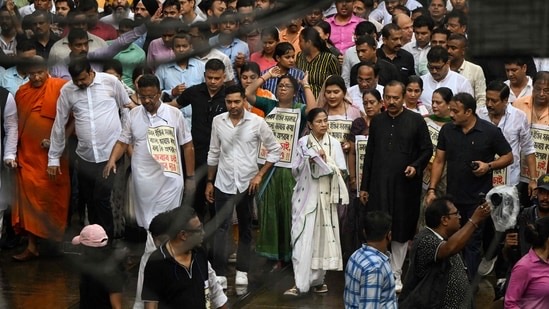Mamata Banerjee led a protest in Kolkata against the harassment of Bengali-speaking people in BJP-ruled states, joined by senior Trinamool Congress leaders. West Bengal chief minister Mamata Banerjee on Wednesday afternoon led a protest in Kolkata against the alleged harassment of Bengali-speaking people in Bharatiya Janata Party-ruled states.
Senior leaders of the party, including Trinamool Congress national general secretary Abhishek Banerjee, also joined Mamata Banerjee as she took to the streets along with thousands of people. The march began from College Square in central Kolkata around 1.45pm and will terminate at Dorina Crossing in Dharmatala.
The nearly 3-km-long route was wrapped in security, with nearly 1,500 police personnel guarding the barricaded pavements and adjacent buildings. Vehicular traffic was diverted along multiple arterial roads in the central parts of the city because of the programme.
Addressing a massive public gathering during the protest march, Mamata Banerjee said, “The BJP calls all Bengali-speaking people Bangladeshi Rohingyas… Rohingyas live in Myanmar. Here, all citizens of West Bengal have proper ID cards and identification. The labourers who have gone outside Bengal have not gone on their own. They have been employed because they have skills… Anyone who speaks Bengali is being arrested and put behind bars. Why? Is West Bengal not a part of India?”
“I am ashamed and disheartened of the BJP’s attitude towards Bengalis,” Mamata added. Similar protests were held by the TMC in the district headquarters towns across the state. The demonstrations are being held a day ahead of Prime Minister Narendra Modi’s scheduled visit to West Bengal, where the assembly elections will be held next year. With less than a year left for the assembly elections in West Bengal, the TMC is raising its pitch over what it alleges is a systematic pattern of linguistic profiling, unlawful detentions, and attempts to brand Bengali speakers as “illegal immigrants”.
The ruling TMC usually refrains from holding major public events in the run-up to its annual Shahid Dibas rally on July 21. But the series of recent incidents, including the detention of migrant workers in Odisha, eviction drives in Delhi, and a notice served to a farmer in Cooch Behar by a foreigners’ tribunal in Assam, appears to have compelled the party to shift gears.
The protests also give a glimpse of the thrust of TMC’s campaign for the assembly elections, which will be due mid-next year. The party seems to be betting heavily on rekindling the emotional connection with voters through a campaign that blends identity politics with grassroots mobilisation.
Countering Banerjee’s emotive pitch of Bengali pride, Leader of the Opposition Suvendu Adhikari alleged that the whole exercise of “Bengali asmita” is being flaunted to shield the presence of “Bengali-speaking Rohingyas and illegal Bangladeshi infiltrators”. Adhikari took a dig at the chief minister and asked why she has turned a “deaf ear to the cries of exasperation of thousands of Bengali-speaking teachers in the state who lost their jobs” on account of institutional corruption.
Referring to Banerjee’s appointments to the top administrative and police posts in the state, Adhikari asked, “Why were Atri Bhattacharya and Subrata Gupta, two Bengali officers, denied the position of state chief secretary and offered to Manoj Pant, despite the latter being junior to the former two bureaucrats?” “Why was the senior-most IPS officer Sanjay Mukhopadhyay ignored for the position of DGP where an out-of-state junior, Rajiv Kumar, was posted?” he asked in a post on X.
Kolkata mayor Firhad Hakim, who took part in the protest rally, said he wasn’t ready to attach too much importance to those allegations. “Adhikari is saying such things to please his bosses in Delhi. His tactic will not work here,” he said.



